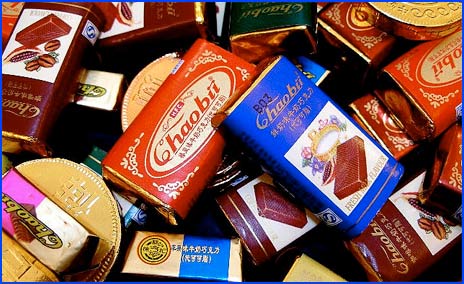
Cravings for any desired and potentially harmful substance are obligingly real enough to show up for scientific measurement. As we know, the human brain, hooked up to a MRI scanner, is capable of reacting to the thought of a chocolate milkshake as if it were a pile of illegal and addictive white powder. What those two substances have in common is their usefulness in “self-medicating.” When feeling bad, a person automatically seeks out a consumable whose contents will tweak the brain into releasing serotonin and other mood-corrective chemicals.
For The Wall Street Journal, Melinda Beck rounds up the most current thinking about food cravings, and relates how a craving gets all up in the hippocampus, where memories are stored, and the caudate, also connected with memory, and the insula, where emotion dwells. Dopamine is the good stuff, the chemical that delivers the reward. It has been verified that women are more susceptible to feeling cravings than men, but strangely, this propensity does not seem to be linked to female hormones. Beck says:
In the U.S., about 50% of women who crave chocolate say their cravings peak around the onset of their monthly period. But researchers haven’t found any correlation between food cravings and hormone levels, and postmenopausal women don’t report a big drop in chocolate cravings, a 2009 survey found.
Furthermore, when women give in to food cravings, they are far less likely than men to find the experience satisfying. This might be because they give in more often, and the result of that is the reward circuits become dulled and unresponsive. Receptors shut down, so the remaining ones demand more.
One of the well-known traits of addiction is the need for increasing amounts of the favored substance. Not only that, but the brain’s prefrontal cortex changes, and that’s where impulse control resides. So, as addiction to food or any other substance progresses, the brain is self-validating and self-enabling. It not only says, “Want more!” — it also says, “Go ahead, have more!”
The journalist also reveals some weird facts about chocolate, which is by far the most widely craved food in North America, especially among women. Difficult as it is to believe, the craving for chocolate is not universal. In Egypt, for instance, only 6% of the women surveyed admitted to chocolate cravings. The suspicion that chocolate love might not be sex-linked is heightened by the main craving of Japanese women — sushi.
Beck points out another interesting thing about chocolate love, namely, that it seems to disprove the old and pretty much universally accepted “nutritional deficiency” theory that cravings are based on some actual biological need. Which may be true in some cases. If a person wakes up craving figs, it might be a signal from the body saying, “I need iron.” But the craving for chocolate, in most cases, indicates something entirely different — a need for emotional comfort.
Since chocolate is, in the West anyway, so consistently craved, it’s useful for experiments, such as the one that Beck cites to show the helpfulness of cognitive behavior therapy:
Researchers in Adelaide, Australia, gave 110 self-professed chocolate cravers each a bag of chocolates to carry around for a week, and instructed half of them in ‘cognitive restructuring’ — challenging their thoughts about chocolate — while the other half learned ‘cognitive defusion’ — accepting and observing their thoughts without acting on them. At the end, the defusion group had three times as much chocolate left than the other group.
This science of cravings is tremendously important in the childhood obesity field because it targets the point in time where the whole problem can be “nipped in the bud.” If cravings can be controlled, there is no need for discussion about such advanced and severe answers as, for instance, bariatric surgery. Which is why Childhood Obesity News has discussed the subject extensively and will continue to.
Your responses and feedback are welcome!
Source: “How to Fend Off a Food Craving,” The Wall Street Journal, 09/17/12
Image by jenniferphoon (jennifer).

 FAQs and Media Requests:
FAQs and Media Requests: 











